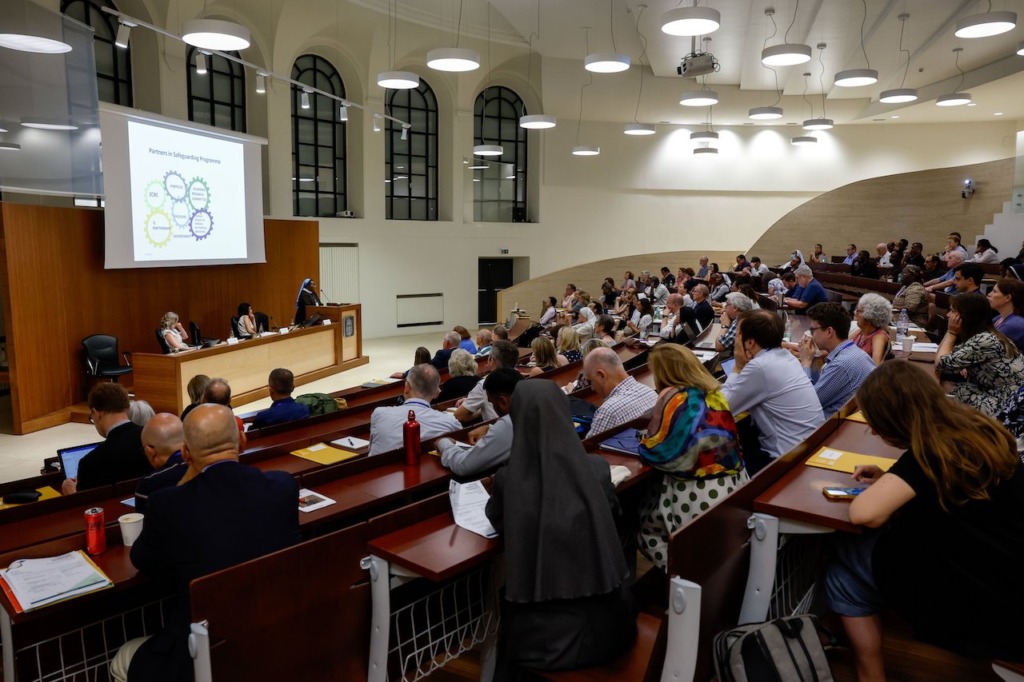ROME (CNS) – The Catholic Church has made great strides in drafting norms to protect children and other people at risk of abuse, but “we don’t have a culture of accountability when it comes to the implementation of those norms,” said Jesuit Father Hans Zollner, a leading expert in the field.

The Jesuit spoke to reporters June 22 at the conclusion of the 2023 International Safeguarding Conference at Rome’s Pontifical Gregorian University, where he is director of the Institute of Anthropology: Interdiscplinary Studies on Human Dignity and Care.
Beatrice Mumbi, safeguarding coordinator for the Jesuit Conference of Africa and Madagascar, told reporters that ensuring the men she works with and for embrace accountability and follow her directions “is quite difficult” because “patriarchy is real in my context,” so “it really takes the goodwill of the bishop or the priest that I have to deal with to move a situation forward or resolve a situation.”
But in many African cultures, she said, there also persists a “culture of silence” when it comes to sexual abuse. “We don’t talk about those things because we do not want to shame people in leadership, we do not want to harm their standing in society.”
However, she said, “it’s changing. But very, very slowly.”

Archbishop Paul-André Durocher of Gatineau, Quebec, and Archbishop Simon Poh of Kuching, Malaysia, had addressed the conference June 21 about “the challenges faced by church authorities” when it came to accountability.
Archbishop Poh told reporters the next day that in most of Asia safeguarding programs are in their infancy, but a growing number of bishops are committed to implementing steps to screen candidates for the priesthood and parish volunteers.
“Maybe seven, eight years ago, the thinking was that this is a Western problem. That was the mentality,” the archbishop said. But now people realize “it is not a Western problem; it is a human problem.”
Archbishop Durocher said that in Canada there has been a “sea change” over the past 30 years with the bishops moving from an emphasis on setting up structures to accept and investigate allegations to focusing on the victim and learning “how to listen to a victim speak about their allegation in a way that will be compassionate, understanding and that will respond to their needs.”
In his presentation to the conference, the archbishop said he found it helpful to make an “examination of conscience” about his own accountability using traits described in the book, “The Oz Principle: Getting Results through Individual and Organizational Accountability.”
“Accountability,” he said, is “an attitude, a virtue even,” that goes beyond responsibility. “It implies taking true ownership for a situation and personally engaging with it in order to move it forward.”
It also requires continual monitoring, measuring and adjustment, he said.
For a bishop, true accountability requires “communicating openly and candidly,” the archbishop said, although “this is not a habit in our church.”
A bishop must ask for and accept feedback, he said.
“I must continually ask myself: ‘What more can I do? What are the best practices arising and how can I integrate them in my ministry and in my diocese?’” Archbishop Durocher said. “I’m afraid too many bishops – and too many of our faithful – think that this crisis is behind us.”
“I believe this crisis will always be with us, because, just like the poor, abusers will always be with us,” he said. “We cannot let down our vigilance, we must constantly be seeking to improve.”
“The sexual abuse crisis has deeply hurt that bond of trust between bishops and priests, between laity and clergy, between believers and non-believers,” the archbishop said.
“It will take a long time to rebuild that trust, probably a few generations. And it will only happen if we continually to make it a priority – if I, as a bishop, make it my priority,” he added.
###
Bishop Knestout: world taking ‘issue very seriously’
by Lily Nguyen Dunkle, The Catholic Virginian
Bishop Barry C. Knestout was among the four bishops in attendance at the International Safeguarding Conference – along with more than 200 priests, women religious, and lay leaders from some 50 nations – calling it “a very valuable time to get a clear perspective of what is happening internationally.”
“In the United States, we have come a long way in addressing” the issue of clergy abuse, said the bishop.
“The whole world is very much taking the issue very seriously and trying to implement good policies and practices to safeguard children. I think there is a seriousness and commitment that was expressed across the board and was evident at the conference,” he added.
Bishop Knestout is the chair-elect of the U.S. Conference of Catholic Bishops (USCCB) Committee on the Protection of Children and Young People.
“I have not officially taken my position as chair yet, so this was a chance for me to get up to speed on what is happening at the international level,” said the bishop.
Bishop Knestout will assume his new role as chair of the USCCB committee in November.

